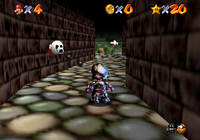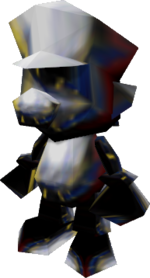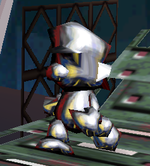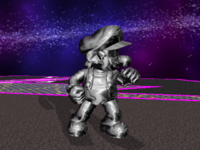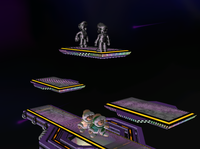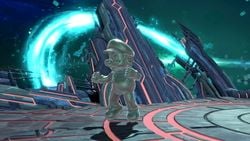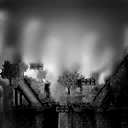Metal Mario: Difference between revisions
| (317 intermediate revisions by more than 100 users not shown) | |||
| Line 1: | Line 1: | ||
''' | {{ArticleIcons|ssb=y|ssbm=y|ssbb=y|ssb4=y|ssbu=y}} | ||
{{Boss | |||
|name = Metal Mario | |||
|image = [[File:Metal_Mario_Artwork.png|200px]] | |||
|caption = {{symbol|metalmario}}<br>Official artwork of Metal Mario from ''{{s|mariowiki|Mario Kart 7}}''. | |||
|boss = ''[[SSB]]''<br>''[[Melee]]''<br>''[[Ultimate]]'' | |||
|universe = {{uv|Mario}} | |||
|console = [[Nintendo 64]] | |||
|location = [[Meta Crystal]]<br>{{SSBM|Battlefield}}<br>[[New Donk City Hall]] ([[Ω form]]) | |||
|creator = | |||
|voiceactor = | |||
|interwiki = supermariowiki | |||
|interwikiname = Super Mario Wiki | |||
|interwikipage = Metal Mario (character) | |||
}} | |||
'''Metal Mario''' ({{ja|メタルマリオ|Metaru Mario}}, ''Metal Mario'') is a character from the {{uv|Mario}} series. | |||
== | ==Origin== | ||
Metal Mario | [[File:MetalMario-64.png|thumb|left|Metal Mario as he appears in ''Super Mario 64''.]] | ||
Metal Mario debuted in ''{{s|mariowiki|Super Mario 64}}'' as the metallic power-up form of [[Mario]]. He can be obtained by collecting the {{s|mariowiki|Metal Cap}} released from the [[Metal Box]], which can be materialized by activating its corresponding green {{s|mariowiki|Cap Switch}} in the {{s|mariowiki|Cavern of the Metal Cap}} portion of the {{s|mariowiki|Hazy Maze Cave}}. In ''{{s|mariowiki|Super Mario 64 DS}}'', only {{s|mariowiki|Wario}} or a character wearing {{s|mariowiki|Wario's Cap}} can obtain the effects of the Metal Cap, which does not return in this game. Instead, it is obtained from a {{iw|mariowiki|Power Flower|Super Mario 64 DS}}. | |||
Metal Mario | As Metal Mario, Mario is invulnerable, but also extremely heavy. As such, Metal Mario can easily defeat enemies by running into them, can withstand heavy winds, becomes immune to poison clouds, and can walk underwater; however, since he is extremely heavy, he cannot jump higher or farther, he cannot swim, and he sinks in quicksand faster. | ||
Metal Mario makes his debut appearance as a separate character in ''[[Super Smash Bros.]]'', but has made his official debut as a ''Mario'' series character in ''{{iw|mariowiki|Mario Golf|Nintendo 64}}'' and would since become a recurring character in various ''Mario'' spin-off games. | |||
{{clrl}} | |||
==In ''[[Super Smash Bros.]]''== | |||
===As a boss=== | |||
[[File:MetalMario.png|thumb|left|{{SSB|Fox}} vs. Metal Mario]] | |||
Metal Mario debuts as a mini [[boss]] in the ninth stage of the [[1P Game]] and is fought on the [[Meta Crystal]] stage. | |||
Despite appearing as a simple palette-swap of {{SSB|Mario}} at first glance, Metal Mario is a powerful fighter who barely flinches to ordinary attacks, is unaffected by [[grab]]s and [[throw]]s at low percentages. Crucially, he also has a [[handicap]] that allows him to take around 200% before being possible to launch, though it changes based on [[difficulty]] setting. Additionally, Metal Mario is to send the player's character flying slightly farther than normal from normal attacks and throws, but will deal the same damage as Mario. However, he is very weak to [[edge-guarding]]: once a player manages to knock him off the stage, he will often fail to recover due to his extremely fast falling speed, despite the decent distance from his [[Super Jump Punch]]. He also has an 8-frame [[jumpsquat]], making any aerial attack much more sluggish. | |||
[[ | |||
Metal Mario | Metal Mario doesn't sprint and rarely jumps; he simply walks from place to place at a steady pace. He also rarely uses his [[Fireball]] attack, even though a normal CPU Mario uses it often, and {{SSB|Kirby}} will not gain a [[copy ability]] from [[inhale (Kirby)|inhaling]] him. On lower difficulties, he mainly walks around the stage and hardly attacks, but becomes more powerful on higher difficulties. | ||
{{clrl}} | |||
Mario | ===As a playable character=== | ||
: ''Main article: [[Metal Mario (SSB)]]'' | |||
[[File:MetalMarioModelSSB.png|thumb|right|150px|Metal Mario's model in ''Smash 64''.]] | |||
[[File:Metal Mario SSB.png|thumb|left|150px|Metal Mario as he appears in ''Smash 64''.]] | |||
Metal Mario can be controlled if loaded via the [[debug menu]] or the Gameshark code 800A4B3B 000D. Despite his power in [[1P Game]], many players consider him to be far worse than normal Mario. Despite his aforementioned strengths and knockback resistance, he is less resilient than his 1P Game counterpart, as his handicap is removed; additionally, his buffed knockback is neutralised. For all intents and purposes, playable Metal Mario is regular Mario with altered movement physics. | |||
Metal Mario | |||
Metal Mario maintains some knockback-based [[armor]], able to resist weak attacks at lower [[percentage]]s, while being immune to {{SSB|Fox}}'s [[Blaster]] and [[Luigi Cyclone]]'s 1%-dealing hitboxes. He also has reduced [[combo]] potential, as he cannot efficiently follow up with combos after attacking due to an abysmal short hop, 8-frame jumpsquat, and awkward aerial and dashing physics. Metal Mario's fall speed of 100 is faster than his fast fall speed of 72 - the only character in the game like this - making Metal Mario fall ''slower'' when initiating a fast fall. Because of how fast Metal Mario falls, while it helps with vertical survivability, it hinders his [[recovery]], makes getting out of combos very difficult, and also makes him vulnerable to [[chain grab]]s. Notably, Metal Mario's equivalent to [[Mario Tornado]] arguably hinders his recovery instead of helping, gaining almost no height. | |||
{{clr}} | |||
==In ''Super Smash Bros. | ==In ''[[Super Smash Bros. Melee]]''== | ||
===As a boss=== | |||
[[File:Mario_Metal_Box_Melee.png|thumb|left|Metal Mario as he appears in ''Melee''.]] | |||
[[File:MetalMarioandMetalLuigi.png|thumb||Metal Mario and Metal Luigi appear in ''Melee's'' Adventure Mode.]] | |||
Metal Mario returns as a minor boss in [[Adventure Mode]] and is fought during Stage 11 on the {{SSBM|Battlefield}} stage after the player defeats the fifteen [[Fighting Wire Frames]]. | |||
{{Mario Smash}} | Unlike the previous game, Metal Mario is not considered by the game to be a separate character, but rather {{SSBM|Mario}} fighting under the permanent effects of the new Metal Box item, but has slightly faster falling speed and reduced knockback resistance. He is much more aggressive in this installment, no longer ignoring the player at all. | ||
{{Mario Melee}} | |||
Metal Mario is joined by '''Metal Luigi''', the metallic form of [[Luigi]] who appears if {{SSBM|Luigi}} is unlocked, thus making the battle even more difficult. Similar to Metal Mario, Metal Luigi is considered to be Luigi under the permanent effect of the Metal Box (albeit with increased falling speed like his metallic brother). Defeating both characters will result in a Metal Bros. KO bonus where the player receives 8,000 points. | |||
Unlike Metal Mario, Metal Luigi does not reappear as a non-playable character in any modes for the ''Super Smash Bros.'' series after this game. | |||
In addition to their appearance in Adventure Mode, Metal Mario or Metal Luigi will likely appear as a random metal opponent on the penultimate stage in {{SSBM|Classic Mode}}. | |||
{{clrl}} | |||
===Trophy=== | |||
The Metal Mario trophy can be randomly obtained through the 1-P mode of the Trophy [[Lottery]]. | |||
{{Trophy | |||
|name=Metal Mario | |||
|image=Metal Mario Trophy Melee.png | |||
|desc=Mario was in for a surprise the first time he hit a Metal Box in Super Mario 64. The metal cap that popped out transformed Mario into living metal, giving him great stamina, a heavy tread, and the ability to walk underwater. In Super Smash Bros., Metal Mario showed up as an incredibly stubborn midlevel boss. | |||
|gamelist={{Trophy games|game1=Super Mario 64|release1=9/96}} | |||
|game=Melee | |||
}} | |||
{{clr}} | |||
==In ''[[Super Smash Bros. Brawl]]'' and ''[[Super Smash Bros. 4]]''== | |||
In both ''Brawl'' and ''Smash 4'', Metal Mario and Metal Luigi are no longer specific characters, and instead appear as a likely metal opponent fought alone in {{SSBB|Classic Mode}}. | |||
In {{forwiiu}}, Metal Mario or Metal Luigi appear as an intruder just as any other opponent can, replacing one of the opponents before a battle. They can also be fought in {{h2|Special Orders|Crazy Orders}}, where they can appear on any random stage, not limited to Battlefield or ''Mario'' stages. | |||
Metal versions of Mario and Luigi outside of Classic Mode in ''Brawl'' and ''SSB4'' can once again be obtained by collecting a Metal Box. | |||
<gallery> | |||
Mario Metal Box Brawl.png|in ''Brawl'' | |||
MetalMario3DS.jpg|in {{for3ds}} | |||
MetalMarioWiiU.jpg|in {{forwiiu}} | |||
</gallery> | |||
==In ''[[Super Smash Bros. Ultimate]]''== | |||
[[File:MetalMarioUltimate.jpg|thumb|250px|Metal Mario in ''Ultimate''.]] | |||
Metal Mario returns as a boss character in ''Ultimate''. He is fought after defeating the regular {{SSBU|Mario}} during the final stage of {{SSBU|Bowser}}'s {{SSBU|Classic Mode}}. | |||
===Spirit=== | |||
Metal Mario also appears as an Ace-class [[primary spirit]]. | |||
Metal Mario's Spirit Battle uses a [[Metal]] {{SSBU|Mario}} puppet fighter and is fought on [[The Great Cave Offensive]] stage's [[Battlefield form]]. The stage references the Cavern of the Metal Cap where the Metal power-up form is first obtained from ''Super Mario 64''. The music track is based on the Metal boss battle theme song from ''Melee'', which features Metal Mario as a mini-boss. During the battle, Mario is slow but has increased defense and attack, referencing how the Metal power-up form grants the player increased attack power and resistance to damage, but makes them move slower. | |||
{|class="wikitable" | |||
! No. !! Image !! Name !! Type !! Class !! Slots | |||
! Base [[File:Equipment Icon Power Badge.png|20px|Power]] | |||
! Max [[File:Equipment Icon Power Badge.png|20px|Power]] | |||
! Base [[File:Equipment Icon Brawn Badge.png|20px|Attack]] | |||
! Max [[File:Equipment Icon Brawn Badge.png|20px|Attack]] | |||
! Base [[File:Equipment Icon Protection Badge.png|20px|Defense]] | |||
! Max [[File:Equipment Icon Protection Badge.png|20px|Defense]] | |||
! Ability !! Series | |||
|- | |||
| 21 || {{SpiritTableName|Metal Mario}} || {{SpiritType|Shield}} || ★★★ || 1 || 2705 || 8156 || 510 || 1539 || 2042 || 6156 || Weight ↑ || ''Super Mario'' Series | |||
|} | |||
{{clrl}} | |||
==Names in other languages== | |||
{{langtable | |||
|ja={{ja|メタルマリオ|Metaru Mario}}, ''Metal Mario'' | |||
|en=Metal Mario | |||
|fr=Mario de métal | |||
|es=Mario de metal | |||
|de=Metall-Mario | |||
|it=Mario metallo | |||
|nl=Metalen Mario | |||
|ru={{rollover|Марио-металл|Mario-metall|?}} | |||
|ko={{rollover|메탈마리오|Metal Mario|?}}, ''Metal Mario'' | |||
|zh_cn={{rollover|金属马力欧|Jīnshǔ Mǎlìōu|?}} | |||
|zh_tw={{rollover|金屬瑪利歐|Jīnshǔ Mǎlìōu|?}} | |||
}} | |||
==Trivia== | |||
[[File:Metal Mario trophy reflection.png|thumb|The reflection of Yoshi's Island seen on Metal Mario's trophy.]] | |||
*If one looks closely at the reflection on Metal Mario's trophy in ''Melee'', the {{SSBM|Yoshi's Island}} stage can be seen. This is easiest to spot on his hat, nose, or bottom. | |||
*Metal Mario along with [[Giant Donkey Kong]] and to a degree Master Hand (from the Master Hand Glitch) are the first characters to be non-playable in one game, then playable in all future games (with items and/or Special Modes). They would be followed by [[Giga Bowser]]. | |||
*In ''Super Smash Bros''., Metal Mario's series symbol is a bit different from the ''Mario'' series, making it more metallic. | |||
*In ''Smash 64'''s 1P Game, when the [[Announcer]] introduces Metal Mario, his voice gains a slight change and becomes metallic. Although it may just be to place emphasis on Mario's metal composition, the Announcer's voice sounds noticeably deeper and the same change in voice does not occur for announcing any other character in Classic Mode. | |||
{{EnemiesAdvSSBM}} | |||
{{Bosses}} | {{Bosses}} | ||
{{Mario universe}} | |||
[[Category:Bosses]] | [[Category:Bosses]] | ||
[[Category:Trophies (SSBM)]] | [[Category:Trophies (SSBM)]] | ||
[[Category:Unplayable characters]] | [[Category:Unplayable characters]] | ||
[[Category:Characters (SSB)]] | |||
[[Category:Spirits]] | |||
[[es:Mario de Metal]] | |||
Latest revision as of 05:31, September 20, 2024
| Metal Mario | |
|---|---|
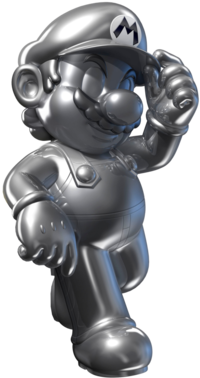  Official artwork of Metal Mario from Mario Kart 7. | |
| A boss in | SSB Melee Ultimate |
| Universe | Mario |
| Console of origin | Nintendo 64 |
| Location | Meta Crystal Battlefield New Donk City Hall (Ω form) |
| Article on Super Mario Wiki | Metal Mario |
Metal Mario (メタルマリオ, Metal Mario) is a character from the Mario series.
Origin[edit]
Metal Mario debuted in Super Mario 64 as the metallic power-up form of Mario. He can be obtained by collecting the Metal Cap released from the Metal Box, which can be materialized by activating its corresponding green Cap Switch in the Cavern of the Metal Cap portion of the Hazy Maze Cave. In Super Mario 64 DS, only Wario or a character wearing Wario's Cap can obtain the effects of the Metal Cap, which does not return in this game. Instead, it is obtained from a Power Flower.
As Metal Mario, Mario is invulnerable, but also extremely heavy. As such, Metal Mario can easily defeat enemies by running into them, can withstand heavy winds, becomes immune to poison clouds, and can walk underwater; however, since he is extremely heavy, he cannot jump higher or farther, he cannot swim, and he sinks in quicksand faster.
Metal Mario makes his debut appearance as a separate character in Super Smash Bros., but has made his official debut as a Mario series character in Mario Golf and would since become a recurring character in various Mario spin-off games.
In Super Smash Bros.[edit]
As a boss[edit]
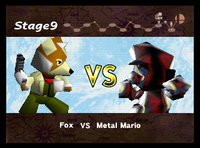
Metal Mario debuts as a mini boss in the ninth stage of the 1P Game and is fought on the Meta Crystal stage.
Despite appearing as a simple palette-swap of Mario at first glance, Metal Mario is a powerful fighter who barely flinches to ordinary attacks, is unaffected by grabs and throws at low percentages. Crucially, he also has a handicap that allows him to take around 200% before being possible to launch, though it changes based on difficulty setting. Additionally, Metal Mario is to send the player's character flying slightly farther than normal from normal attacks and throws, but will deal the same damage as Mario. However, he is very weak to edge-guarding: once a player manages to knock him off the stage, he will often fail to recover due to his extremely fast falling speed, despite the decent distance from his Super Jump Punch. He also has an 8-frame jumpsquat, making any aerial attack much more sluggish.
Metal Mario doesn't sprint and rarely jumps; he simply walks from place to place at a steady pace. He also rarely uses his Fireball attack, even though a normal CPU Mario uses it often, and Kirby will not gain a copy ability from inhaling him. On lower difficulties, he mainly walks around the stage and hardly attacks, but becomes more powerful on higher difficulties.
As a playable character[edit]
- Main article: Metal Mario (SSB)
Metal Mario can be controlled if loaded via the debug menu or the Gameshark code 800A4B3B 000D. Despite his power in 1P Game, many players consider him to be far worse than normal Mario. Despite his aforementioned strengths and knockback resistance, he is less resilient than his 1P Game counterpart, as his handicap is removed; additionally, his buffed knockback is neutralised. For all intents and purposes, playable Metal Mario is regular Mario with altered movement physics.
Metal Mario maintains some knockback-based armor, able to resist weak attacks at lower percentages, while being immune to Fox's Blaster and Luigi Cyclone's 1%-dealing hitboxes. He also has reduced combo potential, as he cannot efficiently follow up with combos after attacking due to an abysmal short hop, 8-frame jumpsquat, and awkward aerial and dashing physics. Metal Mario's fall speed of 100 is faster than his fast fall speed of 72 - the only character in the game like this - making Metal Mario fall slower when initiating a fast fall. Because of how fast Metal Mario falls, while it helps with vertical survivability, it hinders his recovery, makes getting out of combos very difficult, and also makes him vulnerable to chain grabs. Notably, Metal Mario's equivalent to Mario Tornado arguably hinders his recovery instead of helping, gaining almost no height.
In Super Smash Bros. Melee[edit]
As a boss[edit]
Metal Mario returns as a minor boss in Adventure Mode and is fought during Stage 11 on the Battlefield stage after the player defeats the fifteen Fighting Wire Frames.
Unlike the previous game, Metal Mario is not considered by the game to be a separate character, but rather Mario fighting under the permanent effects of the new Metal Box item, but has slightly faster falling speed and reduced knockback resistance. He is much more aggressive in this installment, no longer ignoring the player at all.
Metal Mario is joined by Metal Luigi, the metallic form of Luigi who appears if Luigi is unlocked, thus making the battle even more difficult. Similar to Metal Mario, Metal Luigi is considered to be Luigi under the permanent effect of the Metal Box (albeit with increased falling speed like his metallic brother). Defeating both characters will result in a Metal Bros. KO bonus where the player receives 8,000 points.
Unlike Metal Mario, Metal Luigi does not reappear as a non-playable character in any modes for the Super Smash Bros. series after this game.
In addition to their appearance in Adventure Mode, Metal Mario or Metal Luigi will likely appear as a random metal opponent on the penultimate stage in Classic Mode.
Trophy[edit]
The Metal Mario trophy can be randomly obtained through the 1-P mode of the Trophy Lottery.
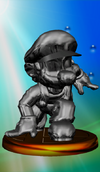
- Metal Mario
- Mario was in for a surprise the first time he hit a Metal Box in Super Mario 64. The metal cap that popped out transformed Mario into living metal, giving him great stamina, a heavy tread, and the ability to walk underwater. In Super Smash Bros., Metal Mario showed up as an incredibly stubborn midlevel boss.
- Super Mario 64 (9/96)
In Super Smash Bros. Brawl and Super Smash Bros. 4[edit]
In both Brawl and Smash 4, Metal Mario and Metal Luigi are no longer specific characters, and instead appear as a likely metal opponent fought alone in Classic Mode.
In Super Smash Bros. for Wii U, Metal Mario or Metal Luigi appear as an intruder just as any other opponent can, replacing one of the opponents before a battle. They can also be fought in Crazy Orders, where they can appear on any random stage, not limited to Battlefield or Mario stages.
Metal versions of Mario and Luigi outside of Classic Mode in Brawl and SSB4 can once again be obtained by collecting a Metal Box.
In Super Smash Bros. Ultimate[edit]
Metal Mario returns as a boss character in Ultimate. He is fought after defeating the regular Mario during the final stage of Bowser's Classic Mode.
Spirit[edit]
Metal Mario also appears as an Ace-class primary spirit.
Metal Mario's Spirit Battle uses a Metal Mario puppet fighter and is fought on The Great Cave Offensive stage's Battlefield form. The stage references the Cavern of the Metal Cap where the Metal power-up form is first obtained from Super Mario 64. The music track is based on the Metal boss battle theme song from Melee, which features Metal Mario as a mini-boss. During the battle, Mario is slow but has increased defense and attack, referencing how the Metal power-up form grants the player increased attack power and resistance to damage, but makes them move slower.
| No. | Image | Name | Type | Class | Slots | Base |
Max |
Base |
Max |
Base |
Max |
Ability | Series |
|---|---|---|---|---|---|---|---|---|---|---|---|---|---|
| 21 | Metal Mario | ★★★ | 1 | 2705 | 8156 | 510 | 1539 | 2042 | 6156 | Weight ↑ | Super Mario Series |
Names in other languages[edit]
Trivia[edit]
- If one looks closely at the reflection on Metal Mario's trophy in Melee, the Yoshi's Island stage can be seen. This is easiest to spot on his hat, nose, or bottom.
- Metal Mario along with Giant Donkey Kong and to a degree Master Hand (from the Master Hand Glitch) are the first characters to be non-playable in one game, then playable in all future games (with items and/or Special Modes). They would be followed by Giga Bowser.
- In Super Smash Bros., Metal Mario's series symbol is a bit different from the Mario series, making it more metallic.
- In Smash 64's 1P Game, when the Announcer introduces Metal Mario, his voice gains a slight change and becomes metallic. Although it may just be to place emphasis on Mario's metal composition, the Announcer's voice sounds noticeably deeper and the same change in voice does not occur for announcing any other character in Classic Mode.
| Bosses | |
|---|---|
| Super Smash Bros. | Master Hand · Metal Mario · Giant Donkey Kong · Fighting Polygon Team |
| Melee | Master Hand · Crazy Hand · Giga Bowser · Fighting Wire Frames (Male · Female) |
| Brawl | Master Hand · Crazy Hand · Petey Piranha · Rayquaza · Porky · Galleom · Ridley · Duon · Meta Ridley · Tabuu · Fighting Alloy Team (Red · Blue · Yellow · Green) · False characters |
| Smash 4 | Master Hand · Crazy Hand · Master Core · Fighting Mii Team |
| Ultimate | Master Hand · Crazy Hand · Rathalos · Galleom · Giga Bowser · Galeem · Dharkon · Dracula · Ganon · Marx · Fighting Mii Team · False characters |
